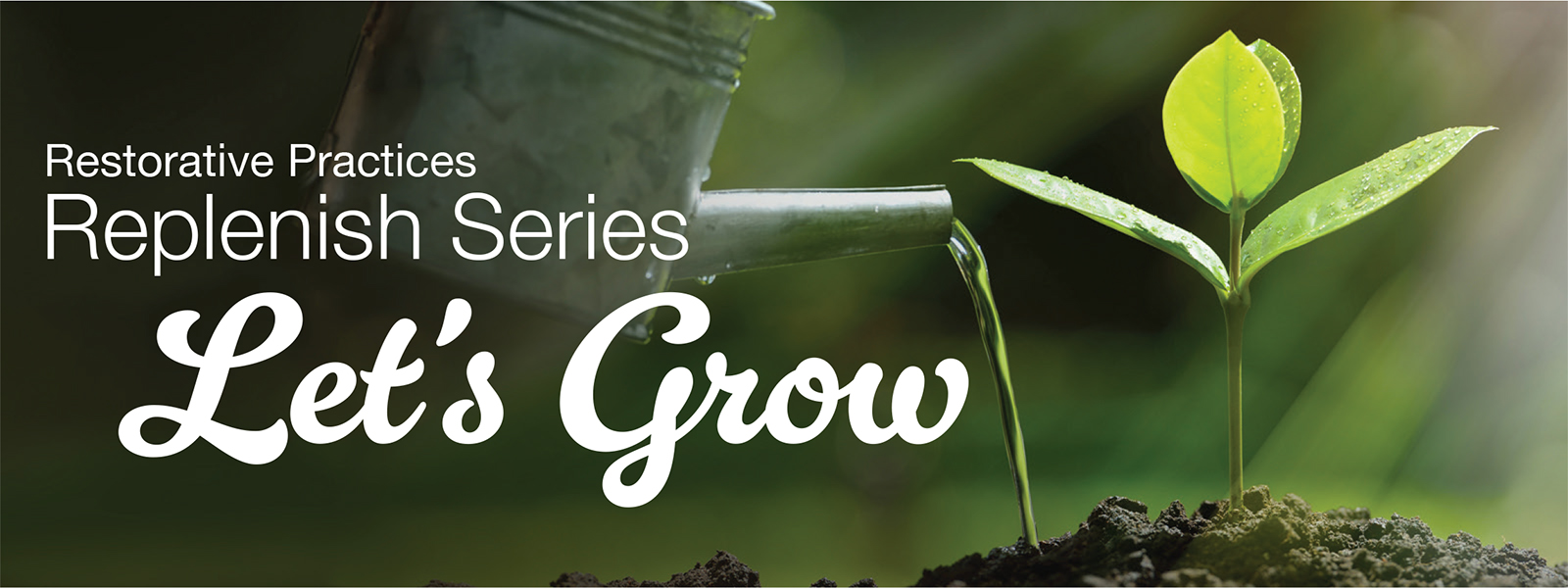
The Replenish Series: Let’s Grow sessions were designed to promote well-being, growth, and educational equity to nurture the full potential of educational practitioners, schools, and communities.
Dr. Rajni Shankar-Brown’s handouts on the session’s topic is a valuable resource that provide takeaway tips and tools that can be used to enhance personal and professional well-being.
The Replenish Series: Let’s Grow is part of Center for Schools and Communities’ Restorative Practices Pennsylvania’s American Rescue Plan – Homeless Children and Youth Initiative.
Supporting Grieving Students and Families
Held May 14, 2024. Grief and loss are universal human experiences that also include complicated and unique dimensions. This session will examine diverse dynamics of grief and loss that students and families are currently experiencing or may experience — loss of housing, death of a loved one, separation or divorce, loss of opportunity, and more. In addition to developing a deeper understanding of grief and loss, we will explore multidimensional restorative approaches, strategies, and tools to best support grieving students and families, along with pathways for care and healing.
The Power of Cultural Humility
Held April 9, 2024. What is cultural humility? How is it different than cultural competence? In addition to providing a restorative space to build community and replenish our spirits, this session will illuminate the power of cultural humility. Through historical and current day educational connections, core concepts, principles, and benefits will be discussed. In addition, promising practices to cultivate cultural humility in our daily lives, schools and communities will be shared.
Managing Screen Time
Held March 12, 2024. Over 90% of youth in the United States have a smartphone or other technological device with access to the internet. Today, many children and youth spend over eight hours a day in front of screens (outside of online learning engagement) scrolling through social media feeds, streaming videos, gaming, browsing the internet, texting, etc. Research demonstrates that screen time is also disproportionately higher for students living in poverty. While there are benefits to using technological devices, high amounts of screen time can be harmful. Explore the dangerous effects of too much screen time and promising strategies for educators to help students and families manage screen time for a more balanced and healthier lifestyle.
A Deeper Dive into Social and Emotional Learning (SEL)
Held Feb. 13, 2024. Research undeniably demonstrates that the potential for SEL to transform our students’ growth is enormous. SEL encompasses a broad spectrum of skills, attitudes, and values that help us to navigate situations and life more healthily. SEL emphasizes the importance of mindset, supports well-being, and can help promote success in school and in life, which is especially important for students living in poverty and experiencing homelessness. This interactive workshop will highlight how educators can promote SEL, along with strategies for youth and families to incorporate in daily life.
Unpacking Trauma and Adverse Childhood Experiences
Held Jan. 9, 2024. It is important to reflect on and develop a deeper understanding of historical, collective, and individual trauma. How does trauma and Adverse Childhood Experiences (ACEs) impact learning and well-being? In this virtual workshop, educators and youth service providers will develop a deeper understanding of trauma and ACEs from interdisciplinary perspectives including the arts. Equity centered strategies to support students and families will be shared.
Building Healing- Centered Learning Environments
Held Nov. 21, 2023. The prevalence and rise of trauma and Adverse Childhood Experiences (ACEs) and the importance of intentionally promoting healing in schools and communities merit our immediate attention. How can we help to address and prevent trauma? How can we promote healing-centered engagement in our schools and communities? In this virtual workshop, educators and youth service providers will explore promising practices that prevent and address trauma, and actively support healing.

Rajni Shankar-Brown, Ph.D.
Meet our instructor, Rajni Shankar-Brown, Ph.D.
Rajni Shankar-Brown, Ph.D., is an award-winning professor and the endowed chair of social justice education at Stetson University, President of the National Coalition for the Homeless Board, and the Executive Director of the Institute for Catalyzing Equity, Justice, and Social Change
She is also the co-Chair of the Equity and Justice SIG for International Society for Teacher Education, and the founder of the Poverty and Homelessness Conference, University Dream Scholars, Acts of Kindness and Justice Movement, and the faculty advisor for the Student Homeless Coalition. Dr. Shankar-Brown is an interdisciplinary educational scholar of social and environmental justice, community organizer, cultural strategist, human rights activist, poet, and artist. She began her career as a public-school teacher and has worked in a variety of transformative leadership roles with communities, organizations, government agencies, corporations, and schools in urban, rural, and suburban areas across the United States and around the world.
As an internationally renowned educational expert in transformative education, equity centered practices, healing centered engagement, and arts integration, she has presented around the globe and authored leading works including a national educational justice book series and a collection of poetry. In addition to being a passionate educator-scholar, she is a devoted Amma (mom) and chai enthusiast.
